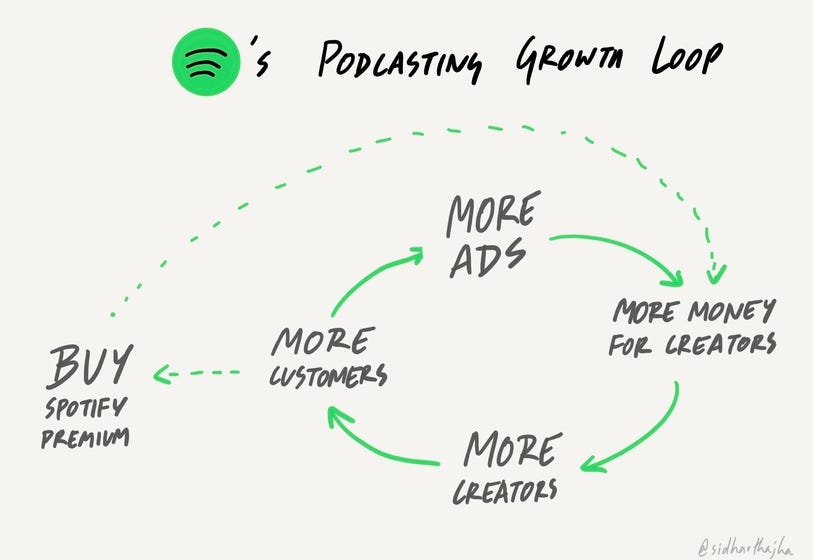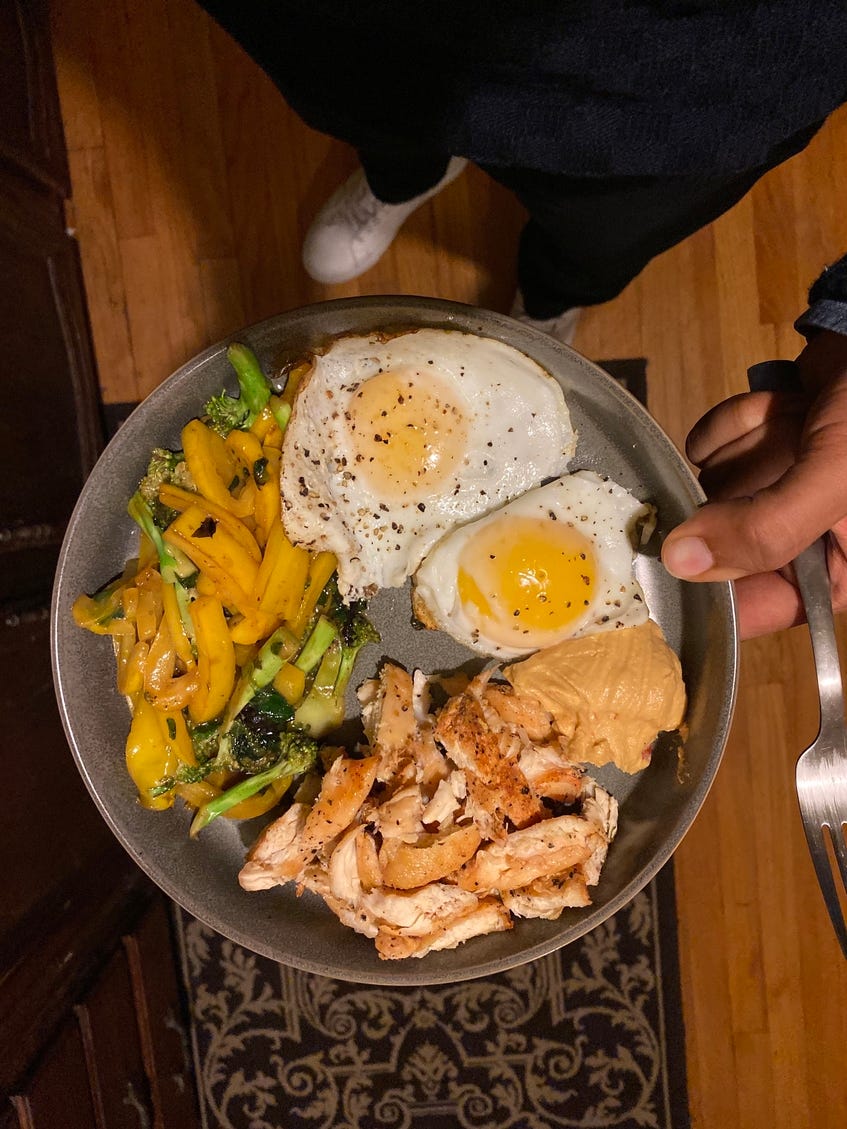Sunday Snapshots (12th January, 2020)
Lessons from LBJ, Thinking in Bets, Spotify and Podcasting, and Animal populations
Hey everyone,
This week’s been busy getting into the grove of things as my quarter kicks off. I have a great schedule for the next three months with lots of unscheduled blocks of time for writing and exploring things in details, so except Snapshots to become a bit longer.
Two things first:
One of my New Years resolutions from my 2019 Annual Review is to write a book called Lessons from LBJ about the lessons that we can learn from Lyndon Johnson on how to succeed in organizations and make a name for yourself. I published two things to kick off this project:
A website for the project where you can enter your email for updates and a free PDF draft of the book in July 2020.
Since public accountability can do wonders for staying on track, here’s a public timeline of how I intend to write this book.
Last week, I published an article called Things I wish I had written in 2019. It’s pretty self-explanatory :)
With that out of the way, let’s dig into this week’s Snapshots:
Thinking in Bets by Annie Duke
Spotify’s new moves in the podcasting space
Counting animal populations using the principles of statistics
And more!
Book of the week

This week, I read Annie Duke’s Thinking in Bets. The book is very important – all of our decisions today are leveraged by large capital and technology – but can be a bit dry. The basis premise is that any decision is a bet on the outcomes of the world. We make particular decisions because we think it will lead to the best possible outcome. Theses decisions are based on our beliefs. If our beliefs are false, then our decisions are flawed. Duke then discusses common pitfalls and lays out strategies to improve our decision-making muscles.
Here were my main takeaways:
Form beliefs first, scrutinize later: We are pre-disposed to take information at face value. When you read something, you assume it is true. You may say to yourself, “No, I’m not like that. I’m objective and scrutinize based on content.” That’s just not true. This idea of forming a belief based on information and only scrutinizing it later is hardwired into us. Knowing this can help us become more objective and better decision-makers.
Misattribution to luck and skill: We are exceptionally kind to ourselves. When something bad happens to us, we attribute it to bad luck. When something good happens, it was because of our hard luck and dedication to the task. Unfortunately, this is a flawed view of the world and stops us from being objective. More importantly, it prevents us from learning from our mistakes. In reality, all things are a combination of luck and skill. When something good or bad happens to us, we should take stock of to what extent was the outcome related to our skill or our luck. We should do this especially when the outcome is good in order to avoid becoming complacent for no reason. Ultimately, this helps us in becoming better decision-makers.
Being unkind to others: We are exceptionally unkind to others. When something bad happens to them, we think to ourselves, “That must have happened because he didn’t deserve it enough.” or “She obviously didn’t work hard enough.” When something good happens, we tell ourselves that “they just got lucky.” This is seriously problematic. Not only does it lead to us being unkind to others, but it also means that we don’t take time to learn from them – both the good and the bad. The first German chancellor Otto Von Bismarck said:
Only a fool learns from their own mistakes. I prefer to learn from the mistakes of others.
When others have success or failures, we should learn from them – we don’t live long enough to have all of them ourselves.
Accountability: One of the best ways to improve your decision-making is to talk to others about why you’re making a given decision. We all have blind spots from inexperience or too much experience. While taking about decisions – especially personal decisions – can be tough and make us seen vulnerable, it can single-handedly improve the quality of your decisions. On the flip side, we have to make people feel comfortable to discuss their decisions with us. To do this, think about yourself as a sounding board instead of sharing your own opinions. You want the other person to come to their own decisions. You’re just a conduit to get the decisions out of them.
Regret Minimization: Jeff Bezos’ favorite book is Remains of the Day by Nobel prize-winning author Kazuo Ishiguro. In it, Stevens is a butler for a Nazi apologist. He looks back at his life serving this flawed man with regret. We should make decisions that will lead to the least amount of regret. Thinking about questions like “Has the way I’ve reacted to this situation lead to the least amount of regret in the future?” will only make our decisions better but also makes us kinder and more fun to be around.
Thinking in Bets is an important book and if you have important decisions ahead of you, it’s worth the slog of reading it.
Business move of the week
Spotify Rolls Out Technology Aimed at Helping Podcast Advertisers
Note: I’ve published this as a permanent post on my blog and as a tweetstorm.
Spotify has been making some big moves in the podcast space. It acquired Anchor and Gimlet Media last year. At face value, these two acquisitions seem paradoxical. Anchor makes it easy for anyone to create and publish a podcast – this forms most of the “long tail” podcasting content. Gimlet Media has a host of exclusive, high-production value shows – this is the idea of having “exclusives” to pull people in.

This week, it announced that it is launching an ad network for podcasts. Monetization has been the big missing link for podcasts. Some creators have solved this by doing ads by forming direct relationships with advertisers, some sell merchandise, some use a Patreon, and some use it as a branding platform for speaking engagements and consulting. No one has figured what’s the best way yet.
But before we dive too deep into that, why is Spotify doing this at all?
The problem with Spotify has always been the music labels. In exchange for allowing Spotify to host their catalogs, the labels get paid on a per-listen basis. This means that Spotify does’t own the content and has a marginal cost payout structure. The more the listens, the more Spotify has to pay the labels. This leads to a cap on their profit potential. To extract most of the value, you have to own the content and get paid out on a fixed cost payout structure where your costs remain the same and your profits increase as the number of subscribers you have increase. You can see this in their financials:

Cost of revenue has clearly grown steadily in line with top-line revenue. These are not software-like margins. While Spotify can and will try to form independent relationships with upcoming artists, the power of music labels means that there is a cap on how well it can do in that space.
No one knows this problem better than Spotify.
So it’s moving to podcasting. So far, there has not been a centralizing force for podcasting the way Google was a centralizing force for the internet. By trying to own both types of content (long-tail and exclusives) and by owning the distribution (it already has almost 250M monthly active users, it’s trying to become that centralization force.
This is where monetization comes. It gives Spotify something that other open-source players like Overcast and PocketCasts don’t have which attracts both advertisers and as a result creators to its platform. The expectation is that this creates a growth loop where more ads on Spotify exclusive content means more creators come on it exclusively, which in turn leads to more advertisers willing to come on its platform, which in turn means more creators. During this process, many more users would also convert to Spotify Premium. It looks something like this:

The big concern here is for the open standards that modern podcasting is based upon. You and I could decide tomorrow that we want to create a better podcast player and we could populate it with most of the podcasts available today. In Spotify’s vision, this would not be possible because creators would presumably have to sign on to the platform exclusively in exchange for access to its ad network.
While I’m not necessary against this because it would probably mean that many more creators would be able to earn a living doing what they love, it would mean the end of democracy for the medium.
There’s also a dark horse here – Apple. It has the most popular podcasting player which is built on open standards. My prediction is that if Spotify is successful in its plan and people start switching from Apple Music to Spotify Premium because they are already listening to podcasts on Spotify, Apple will come in, talk about a “free standard” for users. They have done the same thing with privacy. It’s easy for them to do this because they are not in the ads business. They are in the differentiated hardware and software business. It’s easy to complain about the downsides of something when your business doesn’t depend on it. I’d actually call it excellent PR.
Ultimately, I think monetization on podcasts will not be solved by an ad network because it’s not native to the medium. There will be something else that comes along. That makes this an exciting space.
If you thought that podcasting was played out, think again.
Random corner of the week
I thought this was a really cool method that utilizes the principles of statistics to get around a tough problem. Check out the whole thread if you’re interested.
Meal of the week

I’ve been trying to stick to my New Year’s resolution of cooking three-fourths of my meals. This is one of the meals I had this week with stir-fried veggies, chicken, hummus, and eggs.
That wraps up this week’s Sunday Snapshots. If you want to discuss any of the ideas mentioned above or have any books/papers/links you think would be interesting to share on a future edition of Sunday Snapshots, please reach out to me by replying to this email or sending me a direct message on Twitter at @sidharthajha.
Until next Sunday,
Sid

